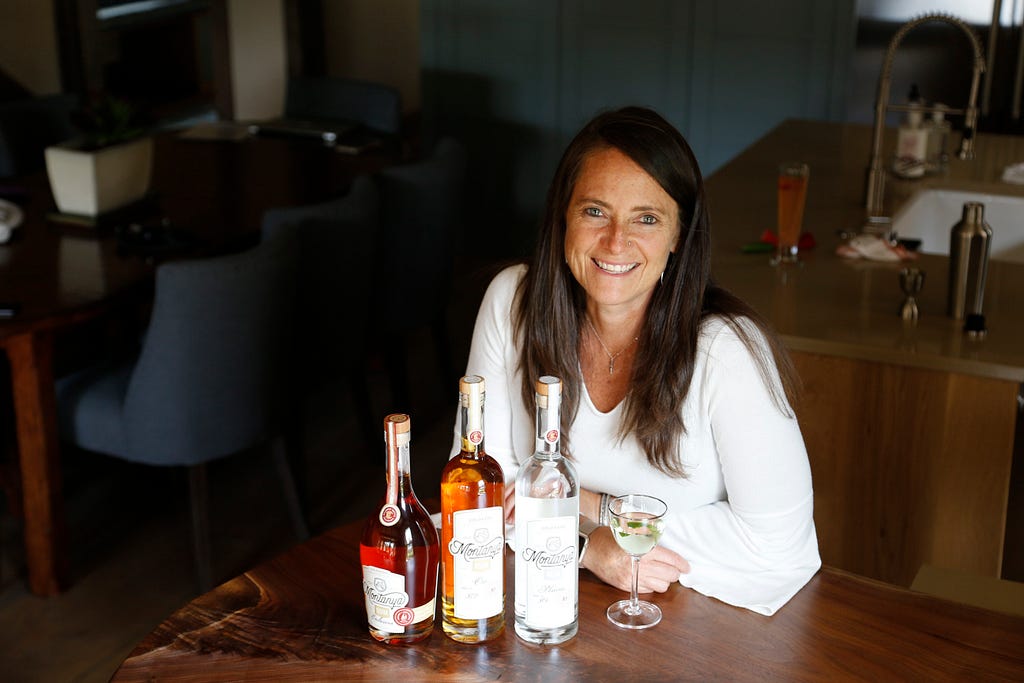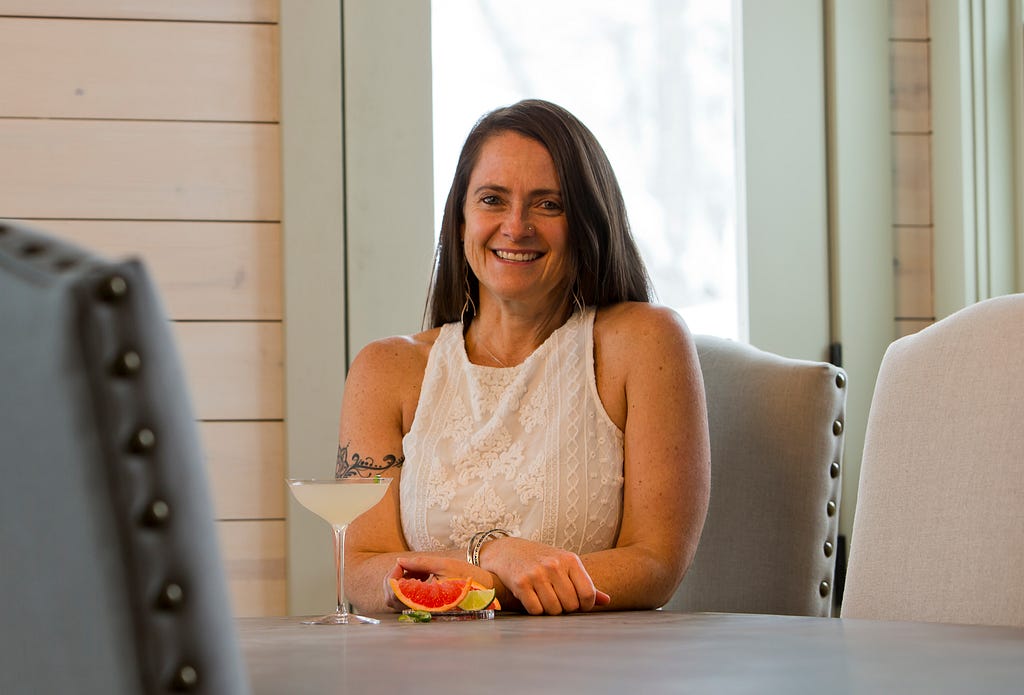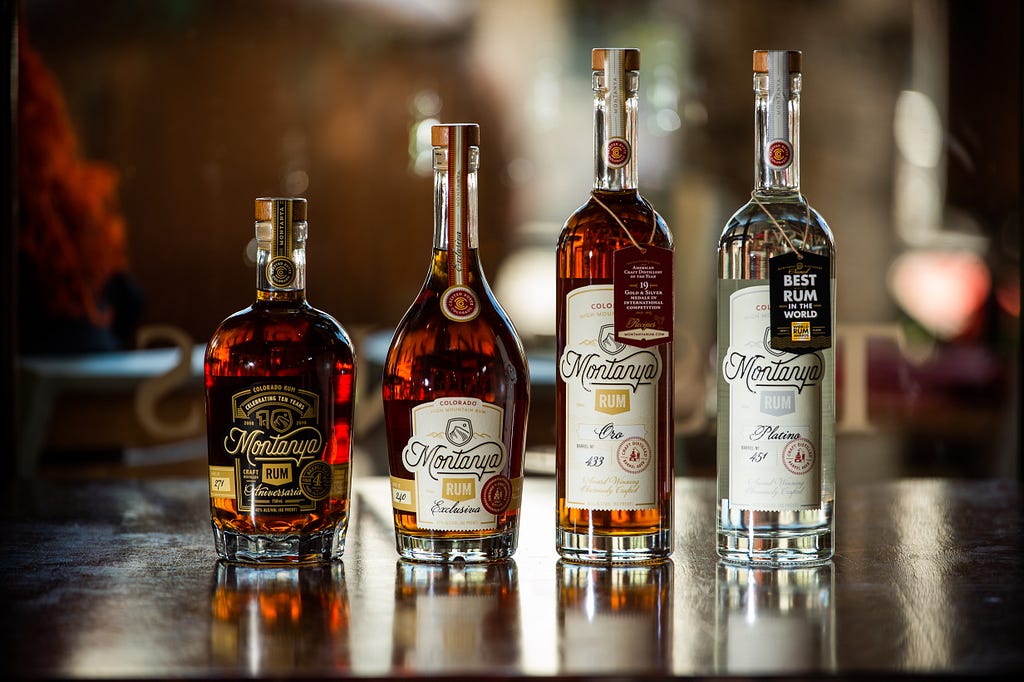Quit Hovering and Create Clear Policies to Help Your Business and Employees Thrive: An Interview with Karen Hoskin

“It is easy to over-monitor, over-assess, over nit-pick employees. For me, this approach often produces the opposite results that I am seeking.”
I had the pleasure of interviewing Karen Hoskin, the founder, owner, and CEO of ten-year-old craft distillery Montanya Distillers in Crested Butte, Colorado. Karen has been an entrepreneur for twenty years with a primary focus on building brands, brand identities and brand experiences for clients and for her own companies. She lives and works at 9,000 feet in the Rocky Mountains, where she has easy access to her favorite pastimes of skate skiing, mountain biking, hiking, and trail running.
Thank you so much for doing this with us! Can you tell us about your journey to becoming CEO?
I have found myself in management and leadership roles since my early years in college, managing restaurants and bars back in the late 1980’s. It took twenty years for me to realize that I wanted to build something that I owned at the end of the day, rather than handing it off to someone else. My father was a small business owner from the time I was in fourth grade, and I spent my summers working for him. I learned by watching his work ethic, but I wonder if I’d been a boy if he might have groomed me differently. We never talked about business. I have accomplished what I have through trial by fire and frontier learning, following my gut instincts. I think that has made me agile since everything from technology to strategy has changed so quickly in every aspect of business.
What is your definition of success?
I have never defined success as money. I have been more committed to creating workplaces that support the people, environment, and community we work in. This approach may have impeded my investor returns, but committing to a triple bottom line has been much more rewarding for me personally. I define success as the ultimate balance between contributing positively, creating something beautiful, offering the fruits of the labor beyond myself, all while being able to send my kids to college.
Can you share the funniest or most interesting story that happened to you since you began leading your company?
A few years ago, I began speaking to my board about hiring my replacement. I am fairly capable of recognizing my limitations, and I began to think that hiring someone savvier in the spirits industry would benefit the company growth in many ways. I had also started a second company in 2017 and I wanted to be able to give my time to both. As we began to discuss the characteristics of my successor, not one single person in the room used any pronoun except “he”. They were offering “him” pay and commissions that I have never received. I could feel my toes curling up in my shoes, which I have come to understand is my body’s visceral response when I encounter sexism at work. I decided right then that clearly my work was not finished and here I still am, two years later, creating 25% annual growth and making sure the pronoun “she” remains in our boardroom.
What failures have you had along the way? How have they led you to success?
I have failed to build this company in the way I have been advised and encouraged for ten years by every industry insider. There is a rubric that companies follow — I could map it from top to bottom. There is a fairly effective playbook, but whenever I considered it, I felt that it lead me away from my ethos and my personal belief system, ie: all the reasons I went into business in the first place. I failed to position my company to be the one that Bacardi would buy for $19m, so instead they bought a competitor of ours of similar size and age in 2016. Instead, I have stayed smaller and made indelible commitments to people and the environment, while also making something beautiful.
I get irrationally excited when my employees buy a house (something that is phenomenally difficult in our resort town). I had an employee get injured in a bike accident this summer, and it was fulfilling to rally our resources around his recovery from a head injury. I spend too much time caring for the flowers on my bar patios. None of these efforts sell bottles of rum onto liquor store shelves in Peoria, Illinois or New York City. Some would say that means we are failing to be a legitimate brand. I say we are succeeding in putting people and environment before profit every day.
What do you think makes your company stand out?
We have an esteemed history of women tending our stills since day one. We have trained four women to be full-time distillers, fully in charge of their responsibilities and stills, which is still exceedingly rare. Our distillers are not all women, but half or more have been. I think that reflects the world around our distillery.
Recently, I was at the distillery working on the usual many tasks at once. Two business partners came by to ask questions about our compliance process because they were building and permitting a distillery. They sat down near me looking uncomfortable for quite a while. I told them I could answer any questions they might have. They kept waiting nervously. Finally, a man walked into the room — not a distiller or owner. They immediately started peppering him with questions, relieved. My employee finally said, “She’s the one you want to ask, not me. I don’t know anything about that stuff.” But by then I had walked away.
I have made a commitment to help women learn this trade, gain confidence, obtain great jobs and start their own distilleries. This is mostly in response to my own experiences of not being taken seriously most of the time. Mentoring is some of the most satisfying work I do, and it has set my company apart from other distilleries from the start. I was recently elected President of The US Women’s Distillery Guild.

Are you working on any new or exciting projects now?
One of the most exciting projects of 2018 has been the limited release of our Aniversaria Rum in celebration of our company’s tenth anniversary. First, this four-year-old rum is really good, which I should probably not say myself. I absolutely love it and am really proud of it. It is a tribute to some of my mentors over the years like Jake Norris (his Snowflake whiskey inspired the aging process) and Martin Cate (his beautiful rum bar received the Aniversaria’s first public tasting). This rum’s sales are raising money for climate change research at The Rocky Mountain Biological Laboratory and education programs at The Women’s Distillery Guild. It has been aged in three different oak barrels from Colorado distilleries and wineries over its four years. I hope it will become an annual release if I can succeed in duplicating it.
Is your company working to be more sustainable?
This is a very central aspect of who we are, what we do and how we do it. Sustainability also really distinguishes us from other rum producers around the world. We have 29 daily practices at our facilities that consider and improve the impact of every company decision on our workers, products, customers, suppliers, community and the environment. This September, we will officially receive our B Corp Certification, the most stringent third-party evaluation of the sustainability claims we make. We scored very high on the B-Lab assessment and have spent months documenting all of our efforts and their quantitative impacts. The list of actions is too long to detail here, but it goes very deep into daily operations at our distillery, bar, restaurant, bottling line and warehouse. I am also the sustainability correspondent for Distiller Magazine, writing a quarterly column to help other companies consider best environmental practices.
What advice would you give to other CEOs or founders to help their employees thrive?
Trust them. It is easy to over-monitor, over-assess, over nit-pick employees. For me, this approach often produces the opposite results that I am seeking. I have learned to let people find their own path to thrive in the company. Sometimes they need prodding, assistance, or oversight, but the very best among them just crave my trust, empowerment, and a path to advancement.
None of us are able to achieve success without some help along the way. Is there a particular person who you are grateful for who has helped you get to where you are?
My husband Brice.
He has picked me up and put me back together again more times than I can count since this company began. I have had some very frustrating hard days facing sexism in the spirits industry. Sometimes I get text messages from sales reps after I make a presentation in front of a hundred people telling me how sexy I looked in my skirt. I wonder if they even heard what I said. When I wonder if I will ever be treated like a professional owner at work, he reminds me to let it go, go back to work, outfox them all, and keep my eyes on the goal.
Brice believes that women deserve a better work environment in the spirits industry. He understands that often I have to work twice as hard in half the time because I can’t stay at bars working after 10 pm like my colleagues. He treats our female employees with the utmost respect as equals. He has always believed in my skills and let me lead. What do they say? “Don’t advertise your man?” Too late. ☺
How have you used your success to bring goodness to the world?
Mother Theresa, who became one of my greatest heroes after I lived in India, often said: “If you want to change the world, go home and love your family.” I have taken this advice to heart in raising my two sons. They have seen modeled at home a hardworking executive woman balancing the demands of work and home. They have talked through my challenges with me and as a result, the cycles I deal with may well stop with them. They are better environmentalists and advocates for diversity in the workplace than I am. They have also watched me act as a dedicated local philanthropist. If it were up to me, I might give everything away as long as I can eat, sleep comfortably, and drive a car around. They have experienced the satisfaction of giving back more than you take from your community. I feel that our family of four is really dedicated to being good stewards. Any success I may have created has 3 times more impact with their help.

What are your “5 Things I Wish Someone Told Me Before I Became CEO” and why?
- Thoroughly understand how your industry functions in advance, not just as a student but as a curious human being. I had no idea when I started a rum distillery in the US that there was a three-tiered system. This would be like wanting to start Google and not know there was an internet you’d need to use. Prohibition’s demise caused a very complex system of alcohol distribution in the US in order to break the hold of the mafia on alcohol making and distribution. If I had known how hard it was to directly sell to my customers, I might have seriously reconsidered this entire concept.
- Set immediate life boundaries or else work may consume you. One night ten years ago, my eight-year-old son said to me at the dinner table, “So mom, how long are you going to talk about work?” I realized I was subjecting everyone around me to my obsession with this fledgling company. I needed to stop. I made a rule — no more work talk at home after 7 pm. No work at all on Sundays as a general rule. Don’t text employees on their days off, email them if necessary. Turn off the phone for extended periods of time, at least hours but maybe an entire day.
- Deeply consider who to choose for your partners, investors and closest collaborators. Working closely with others can be one of the most satisfying aspects of life in business, but it can also place demands on every aspect of your relationship with a person. I have had three companies over time: one solo, one with my husband and one with a female colleague. I wouldn’t trade any of these arrangements, for they have taught me so much. I was very impulsive in choosing them, which means I got lucky. I have learned that really carefully chosen partners and well-designed agreements make all the difference to success.
- Develop a detailed policy manual, update it annually and live by it. Recently a full-time staffer announced that she would be taking two weeks of vacation during our busiest time of year. We simply couldn’t spare her and meet orders. Luckily, I had a clear policy about how vacations are requested and granted, how we enforce the policy to be fair to all employees, and what actions were necessary to be given time off. She hadn’t followed the policy, so we were able to justify our denial of her request. Without the manual, which she signed off as having read and had a chance to ask questions about, I would have been perceived as unfair and even discriminatory. I enforce policies equally and make no exceptions.
- Don’t hire the most qualified candidate. I made the keynote speech at the American Distilling Institute conference in 2017. I was asked specifically to address sustainability and diversity in the craft spirits industry. Much to everyone’s surprise, I encouraged my 1,500 audience members not to hire the most experienced candidate for their jobs. In doing so, they were reinforcing a terrible lack of gender, racial and ethnic diversity in a fast-growing, relatively new industry. This advice came as a surprise to many in the audience. I shared well-respected research on why diversity makes for more vibrant workplaces. I offered specific methods to find, recruit and train a diverse group of employees. So many people came up to me afterward to say they had never considered creating a training and mentoring program within their own companies to cultivate the pool of applicants they wished had applied.
If you could inspire a movement that would bring the most amount of good to the most amount of people, what would that be?
Quit your single-use plastic habit right now. It is choking the planet.
Carry a reusable coffee cup and water bottle everywhere, every day. Toss a pouch of reusable shopping and product bags in your car for shopping. Carry a kit of a reusable spoon, fork, napkin, to-go container, shopping bag, produce bag and straw in your computer bag or backpack to have with you at all times.
I refuse about 19–20 pieces of convenience trash every single day, even more when I travel, by carrying a system. This is what my other company Zoetica makes (zero waste kits and systems). It is really empowering to say no to trash. People see my system in action and immediately want one.

Can you please give us your favorite life lesson quote? Can you share how that was relevant to you in your life?
Even after all this time, the sun never says to the earth “You owe me.”
Look what happens with a love like that, it lights the whole sky. Hafiz
This Hafiz quote has been relevant to me because my life and work are generally better when my decisions are never made to generate praise, reciprocation, attention, appreciation or direct thanks. I want to burn bright for the people I love and work with. When they benefit from my actions in some way, I want it to be a gift with no strings attached.
Let me tell you, this is NOT the central tenet of the craft spirits industry, which is more like “How much money can I make from you?”
Is there a person in the world with whom you would love to have a private breakfast or lunch with, and why?
Lady Gaga. I adore her for so many reasons, but atop the list is for writing the song “Till it Happens to You,” for the movie The Hunting Ground. She sang it so elegantly and profoundly on stage with rape survivors at the Academy Awards in 2016. I sponsored this film at a film festival that same year. I spoke about my own experience as a sexual assault survivor in front of strangers, including my own son, for the first time. While the credits rolled and the song played, I cried in my son’s arms, filled with rage and hope. Lady Gaga is such a powerhouse of incredible talent. She has faced and overcome so much. I am grateful that she can use her visibility for so much good. Oh and go watch the film.
If you would like to see the entire “5 Things I Wish Someone Told Me” Series In Huffpost, Authority Magazine, ThriveGlobal, and Buzzfeed, click HERE.
Quit Hovering and Create Clear Policies to Help Your Business and Employees Thrive: With Karen… was originally published in Thrive Global on Medium, where people are continuing the conversation by highlighting and responding to this story.
